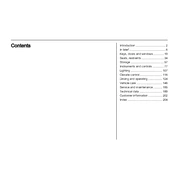Opel Meriva 2011 Owner’s Manual


To reset the service light on your Opel Meriva 2011, turn on the ignition without starting the engine. Press the trip reset button until the service light starts flashing. After holding the button for a few seconds, the light should reset.
The recommended engine oil for the Opel Meriva 2011 is 5W-30 fully synthetic oil, which provides optimal performance and protection for the engine.
First, check the AC fuse in the fuse box to ensure it is not blown. Next, examine the refrigerant level; it might need recharging. If these steps don't resolve the issue, consider consulting a professional mechanic.
A rough idle in your Opel Meriva 2011 could be caused by dirty fuel injectors, a clogged air filter, or spark plug issues. Cleaning or replacing these components can often resolve the issue.
Park the vehicle on a flat surface and apply the handbrake. Loosen the lug nuts slightly, then raise the car using a jack. Remove the lug nuts completely, replace the flat tire with a spare, tighten the lug nuts, and lower the vehicle. Recheck the lug nuts for tightness after lowering.
Open the hood and locate the back of the headlight assembly. Remove the protective cover, disconnect the electrical connector, and release the retaining clip. Remove the old bulb and insert the new one, ensuring not to touch the glass. Reassemble in reverse order.
Common signs include a ticking noise from the engine, difficulty starting the car, and engine misfires. It is recommended to replace the timing belt every 60,000 to 100,000 miles to prevent failure.
Insert the original key into the ignition and turn it to the ON position. Use the new key fob to press and hold the lock and unlock buttons simultaneously for about 15 seconds. The car should lock and unlock to indicate successful programming.
Poor fuel efficiency can result from under-inflated tires, dirty air filters, or malfunctioning oxygen sensors. Regular maintenance, such as checking tire pressure and replacing old filters, can improve fuel economy.
Check the sunroof drains for blockages and clean them if necessary using compressed air or a flexible wire. Ensure the sunroof seals are intact and free from debris. Replacing damaged seals may be required to stop leaks.